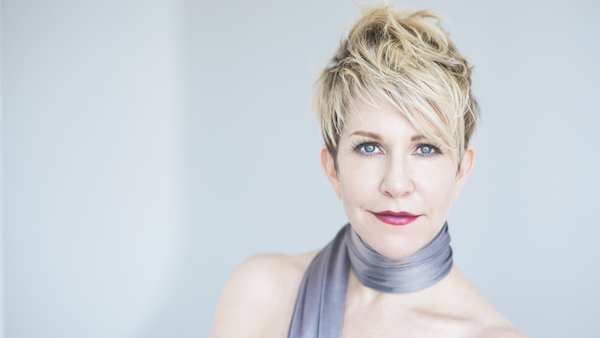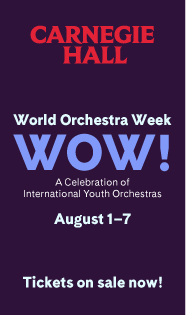Met Orchestra players, DiDonato tease a coming premiere, dish up a saucy “Histoire”

What was old was new again, and what was new sounded agreeably old, as the Met Orchestra Chamber Ensemble performed music by Igor Stravinsky and Kevin Puts Sunday afternoon in the Weill Recital Hall of Carnegie Hall.
The main event was a vivid, full-length performance of a 20th-century landmark, L’histoire du soldat, sounding as fresh and sassy as if Stravinsky had written it yesterday. The prelude was music that, in effect, was written yesterday: Kevin Puts’ She may pick up her pen…, in which mezzo-soprano Joyce DiDonato offered a foretaste of her role as Virginia Woolf in Puts’s opera The Hours, whose world-premiere production will open at the Metropolitan Opera November 22.
As a prelude to the prelude, players from the Met’s much-lauded orchestra pulled back from the new opera’s drama of artistic creation and suicide to travel more spiritual realms, in selections from Puts’s 2012 chamber piece Living Frescoes.
“Living” was a word to cling to in these three works, as images and stories led the listener through a hall of mirrors of art inspired by art inspired by art: a composer contemplating a video installation contemplating medieval paintings; an opera derived from a movie derived from a novel derived from another novel; a Russian folk tale set to military marches, Spanish street music, and American jazz.
For all the tangle of references, the evening was essentially about life—the “be” in “To be or not to be.” In 2012, fresh from winning the Pulitzer Prize for his first opera, Silent Night, Puts composed Living Frescoes in response to the “cycles of birth, death, and rebirth” suggested in Going Forth by Day, a work by video artist Bill Viola inspired by Giotto’s frescoes in the Scrovegni Chapel in Padua.
Writing for Messiaen’s end-of-time quartet of piano, violin, cello and clarinet (yet another reference), Puts did not mimic the French composer’s spacious style, but suggested eternal cycles by framing scenes of life—violent, convivial, or ecstatic—in soft, enigmatic “interludes” that had an open-air feel à la Copland.
The ensemble of clarinetist Dean LeBlanc, violinist Daniel Khalikov, cellist Susannah Chapman and pianist Bradley Moore strongly characterized three of Puts’s original five “frescoes”: the dissonant rage of “Fire Birth,” the light-footed bolero of “The Path,” and the blissful, intertwining melodies of “First Light.” (The two other movements and an interlude were omitted from this performance.)
The idea of “not to be” looms as a theme of The Hours in all its versions—Puts’ opera, the Oscar-winning 2002 film, Michael Cunningham’s Pulitzer Prize 1999 novel—but it was far submerged in the portrait of Woolf offered on Sunday by DiDonato and a thirteen-player ensemble led by the Met’s music director (and conductor of The Hours) Yannick Nézet-Séguin. Instead, the excerpts from Greg Pierce’s libretto floated, lieder-like, on the stream of the author’s consciousness as she contemplated her life and the novel, Mrs. Dalloway, she was attempting to write.
Operatic vocal spectacle was not on the menu as, in the three linked segments, DiDonato as Woolf darkly viewed her scowling husband and tedious country life, longed for the excitement of London, and “watch[ed] in wonder as goods arrive” to the mind of a working writer.
Scaling her rich voice to the small hall and playing well with her instrumental partners, the singer dipped into a robust lower register when watching Mr. Woolf frown over a manuscript, and at the end, captured the author’s wide-eyed wonder at discovering her novel’s immortal first line: “Mrs. Dalloway said she would buy the flowers herself.”
L’histoire du soldat, with its Faustian tale of a soldier’s deal with the Devil, is often heard as a suite of instrumental music with minimal narration if any, but in its original form it was an hour-long theater piece for narrator, actors, dancers and seven musicians. Sunday’s complete performance put all the theatrical responsibility on the broad shoulders of one actor, Marc Kudisch, who didn’t exactly dance, but did roam the stage narrating, miming the action, and depicting characters from soldier Joe to the princess to the wheedling Devil in all his disguises.
Kudisch’s imaginative, high-energy performance of the English verse translation, delivered in a colloquial tone tailored to the intimate hall, was punctuated by sharp-edged parodies of World War I-era popular music and Lutheran chorales, smartly executed by a scrappy little band (its size necessitated in 1918 by wartime privation) consisting of Jeremias Sergiani-Velázquez, violin; Edward Francis-Smith, double bass; Anton Rist, clarinet; Evan Epifanio, bassoon; Weston Sprott, trombone; Raymond Riccomini, cornet; and Steven White, percussion.
Each player made notable individual contributions, led by Sergiani-Velázquez, whose violin brightly told the story of a soldier and his fiddle with eager, scraping staccato and virtuoso flourishes. Riccomini’s cornet twirled an ornate pasodoble in the “Royal March.” White’s vivid percussion drove the action throughout, and memorably went solo to deliver the piece’s fateful final crescendo.
The Met Orchestra Chamber Ensemble performs works of Brahms, Dvořák and Villa-Lobos, 7:30 p.m. Dec. 12 at Weill Recital Hall, Carnegie Hall. carnegiehall.org.
